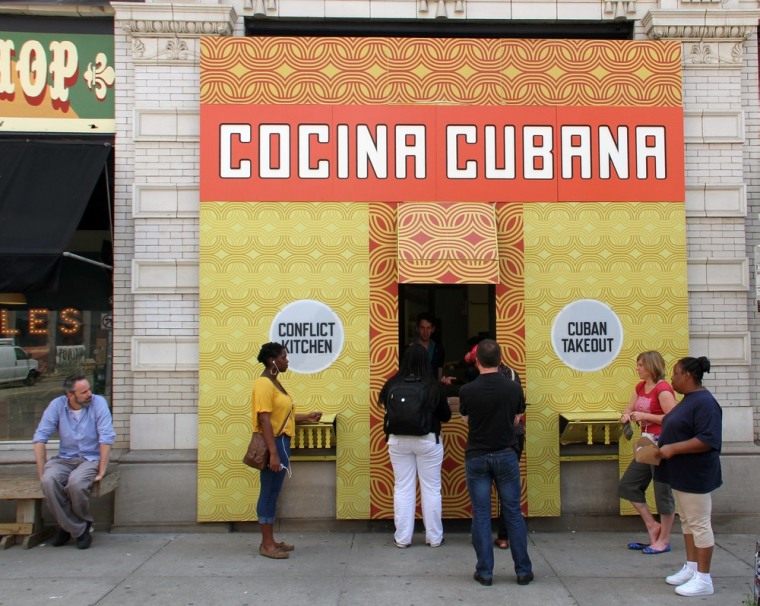When world affairs heat up, so does the menu in an unusual little corner of Pittsburgh, Pa.
Welcome to Conflict Kitchen, a restaurant that only serves food from countries that have drawn the ire of the United States. The goal? To get people talking about the places they may only know from ominous headlines.
Co-founded in 2010 by artists Dawn Weleski and Jon Rubin, the takeout eatery reincarnates itself every six months or so to focus on the cuisine of a different nation with which the U.S. is in conflict.
“The idea of using food was very natural — it’s obviously the way in which many people are introduced to cultures that they might not be familiar with,” said Rubin, who is also a professor at Carnegie Mellon University.
“[But] in many ways, the food is just the excuse for the conversation.”
In the mood for something Iranian? The restaurant’s first reincarnation featured kubideh — a flatbread sandwich with spiced ground beef and fresh basil, mint and onion.
Curious about Afghan fare? Patrons of Conflict Kitchen’s second version indulged in bolani — a turnover filled with either pumpkin, spinach, lentils, or potatoes and leeks.
Hungry for a taste of Venezuela? The third reopening featured homemade arepas, or grilled corn cakes stuffed with either cheese, chicken and avocado salad, or black beans.
And this month, Conflict Kitchen unveiled its Cuban edition, dishing up lechon asado (roast pork) and yuca con mojo (boiled yuca in garlic sauce).
The unusual concept and bright storefront by graphic designer Brett Yasko have caused a stir among the local lunch crowd.
“It’s kind of built to grab your attention and that was pretty clear from the get go,” said Ryan Coon, a spokesman for The Sprout Fund, one of several Pittsburgh civic organizations helping to financially support the project and its mission to start a conversation.
“So there’s a strange, unexpected experience that people have in that community.”
The menu is developed with the help of expatriates from each featured country who also instruct the restaurant’s chef on the nuances of cooking the dish. A typical meal costs $5 and comes nestled in a colorful wrapper that features interviews with people who live in the country in question. Patrons are encouraged to ask lots of questions and engage with the staff — Rubin likes to hire “expert conversationalists” — and one another.
“We’re not a foodie boutique restaurant. We’re definitely just a street-food restaurant that wants to make it very accessible to a wide segment of the public,” Rubin said.
For the Cuban edition, he traveled to the island nation to taste its culinary offerings for himself. It was there that he received some unlikely help for the North Korean edition of Conflict Kitchen he hopes to open down the road.
While exploring Havana, Rubin came upon the North Korean embassy and decided to ring the doorbell. When an attaché came out, Rubin asked him about the region’s traditional dishes.
The discussion never touched on the chronic food shortages that have led to prolonged malnutrition and starvation in the communist country, but the attaché explained North Korean fare isn’t that different from what’s served in South Korea, Rubin recalled.
One item Conflict Kitchen is considering for its menu: cold buckwheat noodle soup.
“The North Korean version is obviously going to be very controversial,” Rubin said. Already, critics have asked whether the eatery would serve the same meager portions as might be expected in North Korea, but Rubin said he’s not trying to recreate the experience of being there.
For now, the staff is focusing on relocating the restaurant to a more prominent location in downtown Pittsburgh at the end of the summer with more exposure to locals and visitors.
“It’ll provide a jolt, in a good way, to their day,” Coon said.
More on Itineraries
